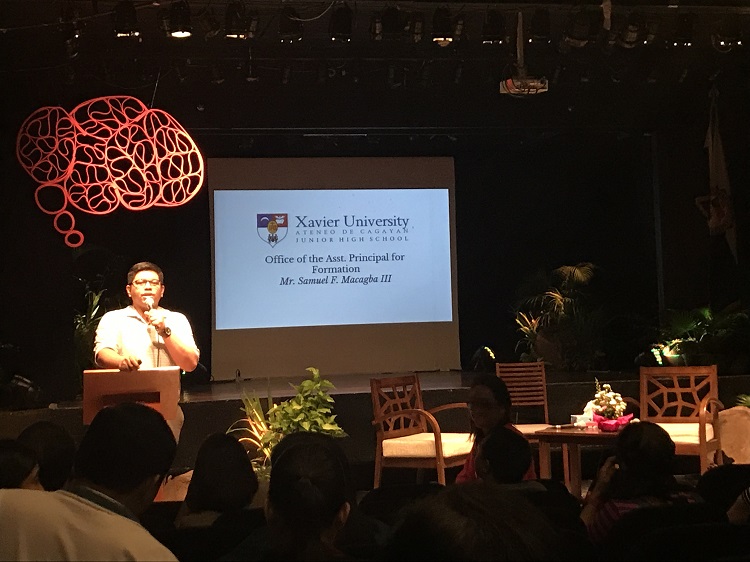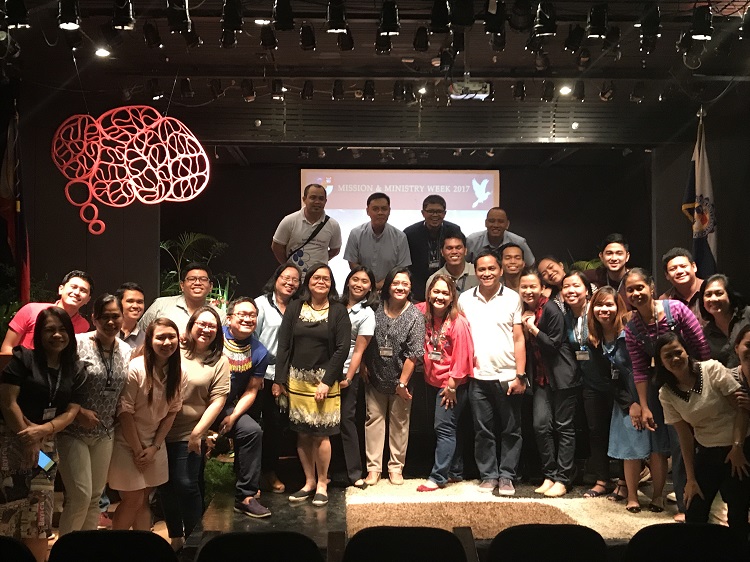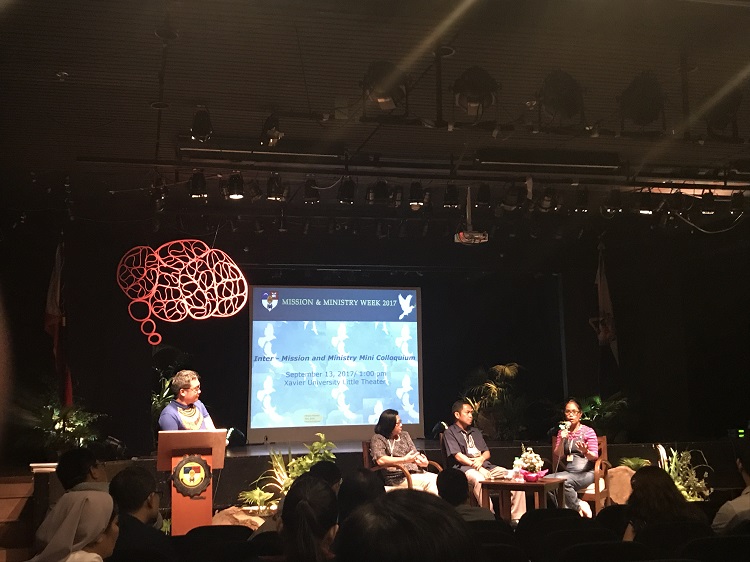
FORMATION COLLOQUIUM. Xavier Univesity - Ateneo de Cagayan Junior High School assistant principal for formation Samuel F Macagba III delivers his presentation at the first-ever Inter-Mission and Ministry Formation Colloquium, in line with the Mission and Ministry Week celebration with the theme, “Mission Marawi: Ikaw, Ako para sa Kalinaw.” Contributed photo.
By Samuel F Macagba III
The Office of Mission and Ministry (OMM) held the first-ever Inter-Mission and Ministry Formation Colloquium on September 13, 2017, in line with the Mission and Ministry Week celebration with the theme, “Mission Marawi: Ikaw, Ako para sa Kalinaw.” This activity aimed to provide a university-wide avenue for all members of the Xavier Ateneo community who are working in various formation units to benchmark formation programs, determine points of convergence and collaboration, and proposed areas of action to improve current practices. All the members of the Mission and Ministry cluster and the Formation offices of the basic education units were gathered as the heads of each office and unit presented their programs and shared the current programs that they are implementing.
It was an overwhelmingly inspiring conversation which provided the initial steps in documenting formation initiatives of the university to respond to the needs of the students. Targeting to be a leading ASEAN University in 2033, this was a perfect opportunity for the whole XU community to strengthen its formation agenda. Archiving all outputs of this colloquium, this activity laid the foundations for an institutional prospect of looking at the formation initiatives of the university as part of the areas that need more research as we claim to form "men and women for others" who can be leaders of character.
To synthesize this fruitful event, a framework provided by Chris Lowney’s book titled “Heroic Leadership” was shared during the colloquium. Lowney was a former Jesuit seminarian who later joined the corporate world. In his book, he shared four leadership qualities that encapsulate our discussion and sharing for that whole day. These four qualities include: Self-awareness, Ingenuity, Love, and Heroism.

MISSION AND MINISTRY. The members of the Mission and Ministry cluster of Xavier Ateneo strike a pose after the colloquium. Contributed photo.
The first quality is Self-awareness. Lowney shared that “Self-awareness is an introspective journey that should involve appreciating oneself, identifying derailing baggage, articulating goals, determining what one stands for, developing a worldview to guide our interaction, and updating oneself.”
This activity has allowed members of the formation team to have that journey of getting to know not just the programs of one’s own unit or colleagues in the ministry, but also understanding other programs in relation to the greater scheme of things. As Xavier Ateneo’s vice-president for mission and ministry Irene Guitarte mentioned, “Coming together as companions, before we cast our nets, it is important that we understand how well are we doing things? How can we help one another?” As such, the members were grateful since this activity has provided them the space to have, as described by Xavier Center for Culture and the Arts director Hobart Savior, a “Conversation of appreciation.”
The second quality is Ingenuity. Lowney said, “Succeeding in this world requires the individual to utilize the personal skills needed to thrive in an environment of near permanent change. The abilities to adapt, to create and to respond quickly are core personal leadership skills for the 21st Century.”
While the members set their aspirations to possibilities, they are humbled and they recognized and realized that while they can do many things, there are various limitations in their work. Several times in their conversations, they have candidly made comments about the need for more time. University Campus Ministries director Michael Acenas also reminded the attendees about the various transitions and changes that they are experiencing which have resulted to a lot of cost-cutting measures and the temporary transfers of some members of their offices to another units or areas. Formator John Dwight Pimentel also pointed out the need to decongest the formation programs of the MM cluster by streamlining and prioritizing activities so that their actions would be, as Savior puts it, not “anticipated, constipated, and even, unmotivated.”
However, they are reminded that this colloquium, no matter how many challenges they are facing, is the first step in doing something and to respond to the peripheries not just of the community but also their internal limitations. Coming together as members of the university has been a challenge and yet they were there because they believe that they can make things better. As Savior asserts, “We can do this only if we are not constricted in understanding our own unit.” He added, “Let us break the barriers!”
The third quality is Love. According to Lowney, “For Loyola, leading was about helping other ‘run at full speed with perfection.’ It was a commitment to see others realize their full human potential.”
While there is a recognition of their own limitations in our ministry of formation, Guidance and Counselling Office director Dr Charito Ferrer shared the need to be reminded that their work is not solely for them. As she puts it powerfully, “Let us come together for our students.” In determining what is best for their students, the body agreed unanimously in the idea of understanding the “felt need,” which was coined by Fr Roberto Archie Carampatan SJ. This felt need has been defined by the attendees in different ways. For NSTP director Dennise Gonzales, felt need can come with the idea of preparing ladderized and consistent formation program. For Fr Carampatan, felt need can come in the face of establishing a family counseling center. For Savior, felt need can come in providing special spiritual growth interventions for the LGBTQ+ community of the university. It can mean a lot of things which include proper social media etiquette, bridging the formation gaps, and going back to the basic values and principles. Thus, this colloquium allowed them to rediscover what the felt needs of the community are so that they could better respond to their needs and to their own to deliver quality work.
The last point is Heroism. Lowney asserts, “If making the mission personal and creating a supporting culture were two ingredients for supportive culture were two ingredients for instilling heroism, the third was giving each individual the opportunity to contribute meaningfully.”
After all that has been said and done, this colloquium provided them the avenue to better understand each of their work in the field of formation. However, the greater challenge that is given to all of them is to reflect and make concrete actions to make their gathering more relevant, not just for themselves, but also for the people around them. They need to answer the following questions: “What happens from now? What have we talked about that can help improve the services that I am giving to my students? Where do we go from here? How do we make meaning from all the inputs that we have gathered and listened to?” Answering these questions becomes the ultimate measure of success of their coming together.
As author Joel Barker explicitly states, “Vision without action is merely a dream. Action without vision just passes the time. Vision with action can change the world.” The challenge given to them was to make a difference by getting out of their comfort zone, celebrate their collaboration with each other, and give the best formation program to the whole Xavier Ateneo community.∎

MISSION AND MINISTRY CLUSTER. The Office of Mission and Ministry holds the first-ever Inter-Mission and Ministry Formation Colloquium as part of the Mission and Ministry Week celebration with the theme, “Mission Marawi: Ikaw, Ako para sa Kalinaw.” Contributed photo.